The Philosophy and Practice of Buddhist Confession in the Song Dynasty
Sheng Kai
Tsinghua University
During the Tang and Song dynasty, Chinese Buddhism underwent a great change, from theory investigation to religion practice. Buddhism in the Song dynasty showed a great orientation toward practice. Confession practices prevailed widely among Tiantai members, and confession ritual procedures were also produced during this time. Jingyuan(1011-1088), a revivalist scholar of Huayan School, had to make efforts to implement the ideas of his own school in order to keep up with the trend. Huayan School lacked a practical aspect. Jingyuan edited Xiuzheng yi, reducing eighteen fascicles into one. However, this work actually reduced the characteristics of Huayan Confession itself, which emphasizes contemplation and thought. The Confession not only constituted a ritual that eliminates individual transgressions and karma, it also included rituals that aim at higher goals. At that time, with particular concerns in the background of “Protecting the Nation via Buddhism” (Guojia Fojiao), it transformed into a ritual that eliminates common karma, in order to protect the nation. In the Song periods, Buddhist communes or societies continued to develop. They brought together various beliefs, and became a type of community united by Confession practices. Under the influence of Confession practices, Chinese Buddhism became popularized and socialized in this period.
Sponsored by the Department of Religious Studies and the Glorisun Fund
For more information, please contact Eric Greene
